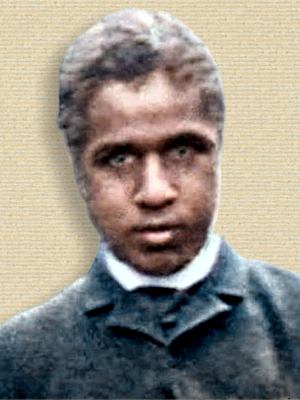 (source)
(source)
|
Cornelius McKane
(2 Feb 1862 - 2 Mar 1912)
Guyanese-American physician , who with his wife Alice Woodby McKane, were Black American medical pioneers in Savannah, Georgia, USA, where they founded a hospital.
|
Cornelius McKane
Alice Woodby McKane
African-American Medical Pioneers
Savannah, Georgia (1892-1909)
Cornelius McKane and Alice Woodby McKane were African-American doctors who worked tirelessly to improve healthcare for African Americans in the late 19th and early 20th centuries. Despite facing racial discrimination, they earned medical degrees, started hospitals and schools, and helped communities in both the United States and Africa. Their contributions had lasting impacts on Black medical education, public health, and social justice.
Early Life and Education
Cornelius McKane’s Journey
Cornelius McKane was born in 1862 in British Guiana (now Guyana). His ancestors were from West Africa, and he felt a strong connection to Liberia, where many freed African Americans had moved. As a child, he traveled to Liberia with his family and learned about the challenges people faced there. Inspired by his grandmother’s stories of resilience, he promised to return one day to help uplift the community.
In 1880, he moved to New York City to get an education. With little money, he was fortunate to meet a Baptist deacon who helped him enroll in school. McKane studied at Sampson’s Bible College and later at the University of Vermont Medical College, earning his medical degree in 1891. He continued his studies at Dartmouth Medical College, where he specialized in treating infectious diseases.
Alice Woodby McKane’s Path to Medicine
Alice Woodby McKane was born free in Pennsylvania. She lost her parents at a young age and even suffered temporary blindness. Despite these challenges, she worked hard and attended Hampton Institute. Later, she earned a degree from the Institute for Colored Youth in Philadelphia. Her passion for education and healthcare would shape her career in profound ways.
Alice dreamed of becoming a doctor, so she enrolled at the Women's Medical College of Pennsylvania in 1889. She graduated with honors in 1891 and moved to Augusta, Georgia, where she became the only Black female doctor in the state at that time. Her work focused on providing care for women and children, a group that often lacked access to proper medical treatment.
Medical Contributions in Savannah
Building a Nursing School
In 1892, Cornelius moved to Savannah, Georgia, where Black doctors were needed. He started a medical practice and co-founded the Southern Medical Association. In 1893, he married Alice, and together they opened the McKane Training School for Nurses. This school trained Black men and women in professional nursing. The program included anatomy, hygiene, and midwifery, and it even offered free tuition for students preparing to work in Africa.
The McKane Training School for Nurses quickly became an essential institution for Black medical professionals. The curriculum was rigorous, requiring students to complete coursework in anatomy, physiology, and patient care. Graduates of the program went on to work in hospitals and clinics across the country, increasing the number of trained Black nurses at a time when few opportunities existed for them.
Starting a Hospital
In 1896, the McKanes opened the McKane Hospital for Women and Children. It was one of the first hospitals for African Americans in Savannah. They also trained new doctors and nurses there. The couple worked hard to raise funds, and the Black community supported their efforts. The Savannah Tribune newspaper encouraged donations to keep the hospital running.
McKane Hospital was more than just a place for medical treatment; it became a center of health education. The hospital hosted public health workshops, teaching hygiene and disease prevention to the local community. This outreach work helped reduce the spread of infectious diseases and improved overall health outcomes for African Americans in Savannah.
Medical Mission in Liberia
Although the McKanes were successful in Savannah, Cornelius still wanted to keep his promise to his grandmother. In 1895, they sailed to Liberia and opened the first modern hospital in Monrovia. The hospital included a drugstore and a nursing school. Alice became a medical examiner for Black Civil War veterans who had moved there.
The McKanes’ work in Liberia was groundbreaking. They introduced modern medical techniques, trained local healthcare workers, and improved access to essential medicines. However, Alice fell ill with African fever. Due to the poor healthcare system in Liberia, they had to return to Savannah in 1896. Some people speculated that Cornelius had failed in Liberian politics, but he insisted they returned for Alice’s health.
Return to Savannah and Later Years
Back in Savannah, the McKanes reopened their medical practice. However, in 1901, the McKane Hospital changed management and became Charity Hospital. Some people believed the McKanes didn’t want to accept money from white leaders, which led to the transition. Regardless, they continued to care for patients in Savannah.
Despite stepping away from Charity Hospital, the McKanes remained active in the medical community. They continued treating patients, advocating for public health, and training young Black medical professionals. Their influence extended beyond Savannah, inspiring other Black doctors to establish similar healthcare facilities in underserved areas.
In 1909, the McKanes moved to Boston for their children’s education. Cornelius continued practicing medicine until he passed away in 1912 at age 50. Alice remained active in politics and social justice. She joined the NAACP, supported women's voting rights, and wrote books, including The Fraternal Sick Book (1913) and poetry in Clover Leaves (1914). She also trained nurses at Plymouth Hospital. Alice lived until 1948 and died at the age of 83.
Legacy
The McKanes’ work changed Black healthcare in America and Liberia. Their schools and hospitals gave African Americans better access to medical care and education. Charity Hospital, which evolved from their work, continued serving Savannah’s Black community for decades.
Today, the site of the former hospital is part of Heritage Place Apartments, a reminder of their dedication. Cornelius and Alice McKane’s efforts helped pave the way for future Black doctors, nurses, and civil rights activists. Their story is one of resilience, determination, and service to their communities.
Their legacy extends beyond the hospitals and schools they built. The McKanes demonstrated that Black medical professionals could thrive despite segregation and discrimination. They trained new generations of Black doctors and nurses, proving that quality healthcare could be provided by and for African Americans. Their impact continues to be felt in Savannah, Liberia, and beyond, reminding us that perseverance and commitment can lead to lasting change.







